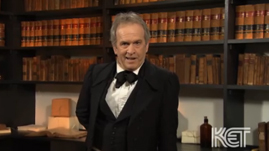Teachers' Domain - Digital Media for the Classroom and Professional Development
User: Preview



George McGee, a drama professor at Georgetown College and a Kentucky Humanities Council Chautauqua performer, performs a monologue scene as 19th century Kentucky statesman Henry Clay. In this scene, an older Clay recalls a childhood incident—the invasion of his family’s farm by British troops the day after his father’s funeral. The scene was taped in the library of the Old State Capitol in Frankfort, Ky.
Find additional arts resources for your classroom at the KET Arts Toolkit website.
Henry Clay (1777-1852) was an important and influential 19th-century American political figure. He served as U.S. Senator from Kentucky, as Speaker of the House, and as Secretary of State. He also ran for president three times, but lost each time. He is often called the “Great Compromiser” because of his successful efforts leading U.S. politicians to reach compromises that delayed the outbreak of the Civil War.
Clay was born in Hanover County, Va., on April 12, 1777. He was the seventh son of nine children born to Reverend John and Elizabeth Hudson Clay. In the spring of 1781, when Clay was three or four (sources disagree on the age), he saw British troops under the Colonel Banastre Tarleton ransack his family home.
Tarleton had come to America in 1775 as a volunteer in the army of British General George Cornwallis and quickly earned promotions. His cruel treatment of both American soldiers and civilians earned him the nicknames “Bloody Ban” and “The Butcher.” His troops pillaged the countryside, instilling fear and hatred, as Clay’s childhood story illustrates. His reputation was so bad that after the British surrendered in October 1781, special arrangements had to be made to protect him.
Henry Clay came to Kentucky in 1797 after earning his law license. He set up a law practice in Lexington. In 1799, he married Lucretia Hart, a member of a prominent Lexington family. His political career began in 1803 when he was elected to the Kentucky legislature. Over the course of the next half century, his political offices would include speaker of the Kentucky House of Representatives, U.S. Senator, and Secretary of State.
Clay ran for president three times. He lost to Andrew Jackson in 1828 and again in 1832. Clay was the leader of the Whig Party, which formed to oppose Jackson. In 1844, he ran for president again, again losing, this time to James K. Polk.
One of the reasons Clay lost the election was his support for the annexation of Texas, where slavery was legal. Voters who opposed slavery did not want a new slave state in the Union.
As the United States continued to divide over the issue of slavery, Clay’s leadership helped forge important political compromises that saved the Union from civil war. The Missouri Compromise of 1820-21 allowed slavery in Missouri, but prohibited it in other areas north of a certain latitude. Clay came out of political retirement in 1850 to help create the Compromise of 1850, which admitted California as a free state but strengthened the fugitive slave law that allowed slave owners to reclaim runaway slaves. This prevented civil war until 1861, nine years after Clay died.
Clay also enjoyed farming. His estate near Lexington was very important to him, and he made important contributions to agriculture as well as to politics. Part of the estate, including a house built by Henry Clay’s son, remains today in Lexington and is a tourist attraction as well as a center for study of this remarkable American statesman.
 Loading Standards
Loading Standards